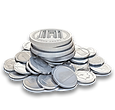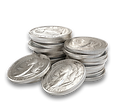The Legacy of Japan’s 1 Yen Silver Coin: History, Design, and Investment Insight
- GoldsilverJapan
- Jun 17, 2025
- 5 min read
When we think of iconic silver coins around the world, the Japanese 1 Yen silver coin stands proudly among them—a bold statement of national modernization, artistic heritage, and enduring value. Struck primarily during the Meiji, Taishō, and early Shōwa eras, the silver 1 yen was not only legal tender but also an important symbol of Japan's entry into the global monetary system.
Whether you're a seasoned collector, a bullion investor, or a history enthusiast, understanding the 1 yen silver coin offers a rewarding journey through imperial symbolism, international trade, and the precious metals market.
Overview: What Is the Japanese 1 Yen Silver Coin?
The 1 Yen silver coin (銀一円) is a large silver coin minted between 1870 (Meiji 3) and 1914 (Taishō 3), with some commemorative strikes and restrikes appearing into the early Shōwa era. It was part of Japan's broader adoption of a Western-style decimal monetary system during the Meiji Restoration.
These coins were struck with a silver content of .900 fineness, weighing 26.96 grams, and measuring 38.6 mm in diameter—comparable to Western trade dollars of the same era.
Historical Context: Meiji Modernization and Global Trade
Before the Meiji period, Japan used a complex system of regional and feudal coinage (such as koban and mon coins). When Emperor Meiji ascended the throne in 1867, Japan underwent rapid modernization to align with global powers. As part of this process, a new monetary system was introduced in 1871 through the New Currency Act (Shinkahei-hō).
The act established the yen as the national currency, and the silver 1 yen was one of its foundational denominations. Its purpose was twofold:
Domestic Circulation – To unify the fragmented economy under a standardized silver coin.
International Trade – To participate in East Asian commerce alongside Chinese dollars and Western trade coins like the U.S. Trade Dollar and the Mexican 8 Reales.
Technical Specifications
Attribute | Value |
Denomination | 1 Yen |
Metal Content | .900 Fine Silver |
ASW (Actual Silver Weight) | 0.78125 troy oz |
Diameter | 38.6 mm |
Weight | 26.96 grams |
Edge | Reeded |
Composition | 90% Silver, 10% Copper |
Mint Years | 1870–1914 (plus restrikes) |
Key Design Features
One of the most appealing aspects of the silver 1 yen coin is its aesthetic design, which reflects Japanese tradition and imperial symbolism.
Obverse (Front)
Motif: Fierce Imperial Dragon (representing strength and national power)
Legend: 大日本 明治三年 (Dai Nippon Meiji San Nen = Great Japan, Meiji Year 3)
Surrounding Beads: Circle around the dragon, symbolizing order
Reverse (Back)
Motif: Wreath made of paulownia and chrysanthemum leaves
Top Emblem: 菊の御紋 (Chrysanthemum Crest), symbol of the Emperor
Center Characters: "一圓" (1 Yen)
Mint Mark: Often appears as small Japanese characters (e.g., "本") representing the mint of origin
The Meiji design was maintained into the Taishō era with minor adjustments to inscriptions, making coins from different periods easy to distinguish once familiar with the era kanji.
Notable Variants and Key Dates
While all 1 yen silver coins are collectible, some years and types command particular attention:
🔹 Meiji 3 (1870) – First Year Issue
Very rare, especially in high grades
Often collected as a landmark coin
🔹 Meiji 8–13 (1875–1880) – Trade Dollar Issues
Sometimes referred to as "Trade Yen" (though distinct from the official Trade Yen of 1875–1877)
Aimed at foreign commerce, especially in China and Southeast Asia
🔹 Meiji 30–33 (1897–1900) – Reduced Production
Scarcer issues due to lower mintages
🔹 Taishō 3 (1914) – Final Circulating Year
Represents the end of the silver 1 yen in everyday circulation
Popular among collectors for its “end of era” symbolism
🔹 Later Showa-era Restrikes
Made for collectors or commemorative purposes
Often restruck using original dies but with slightly different finish (e.g., proof-like surfaces)
The 1 Yen Silver Coin and the Silver Standard
For decades, Japan operated under a silver standard, meaning its currency value was pegged to silver. This made the 1 yen coin more than just a token—it held real intrinsic value in international markets.
However, after Japan adopted the gold standard in 1897, silver coins like the 1 yen gradually lost their monetary role in favor of banknotes and smaller, base-metal coins. Nonetheless, the 1 yen silver coin remained legal tender for many years, circulating side by side with newer coinage until silver redemption was phased out.
Collector Market: Rarity, Grading, and Value
💴 Market Value
Today, the value of a 1 yen silver coin depends heavily on the year, mintmark, condition, and rarity. Here's a rough guide:
Grade | Common Years (e.g., Meiji 10, Taishō 3) | Rare Years (e.g., Meiji 3) |
VG–F | ¥5,000–¥10,000 | ¥30,000+ |
VF–XF | ¥12,000–¥25,000 | ¥50,000–¥150,000 |
AU–UNC | ¥30,000–¥80,000+ | ¥200,000–¥500,000+ |
Proof/Specimen | N/A for most years | Auction-level pricing |
Always verify weight and diameter—many counterfeits exist, especially of high-value years. Collecting PCGS- or NGC-certified coins can mitigate risk.
🧪 Grading Matters
Coins are graded on a scale from Poor (P-1) to Mint State (MS-70). Higher-grade coins exhibit:
Full strike detail (especially in the dragon’s scales and wreath lines)
Luster across the fields
Minimal scratches or edge wear
Coins with damage, cleaning marks, or verdigris may lose 30–60% of their potential value.
Investment Perspective: Is the 1 Yen Silver Coin a Good Buy?
Pros:
Historic Value: A tangible piece of Japan’s economic modernization
High Silver Content: Contains ~0.78 troy ounces of silver
Limited Supply: No more being produced; finite availability
Crossover Appeal: Appeals to both silver investors and numismatic collectors
Cons:
Premium Over Melt: Expect to pay well above silver spot price
Counterfeit Risk: High-value coins are frequently forged
Volatile Pricing: Market demand for historical coins can fluctuate
In sum, the 1 yen silver coin is better viewed as a hybrid investment—combining bullion fundamentals with historical and collector premium.
Real-World Example: A Recent Acquisition
A recent example from our community: A collector purchased a Taishō 3 (1914) 1 yen silver coin for ¥13,000. The coin was in Very Fine (VF) condition, retaining strong detail and a pleasing patina.
The seller was pleased to pass it on to someone who appreciated its value, and the buyer was thrilled to add a transitional-era coin to their growing collection.
This kind of win-win trade is common in the numismatic world—where passion and preservation go hand in hand.
Tips for New Collectors
Start with common years (Meiji 10, Taishō 3) to learn the design and pricing range
Buy from reputable dealers or auction houses
Invest in a digital scale and caliper to verify coin specs
Keep coins in non-PVC flips or capsules to prevent toning and damage
Document your purchases—record the year, mint, condition, and cost for future reference
Where to Buy Authentic 1 Yen Silver Coins
At GoldSilverJapan, we offer a curated selection of authenticated Japanese silver yen coins, including:
Government-certified issues
Professionally graded coins (PCGS/NGC)
Bulk silver yen lots for new collectors
With transparent pricing based on the live silver spot, bilingual support, and secure domestic shipping, we make it easy to own a piece of Japan’s rich monetary legacy.
Final Thoughts: A Coin That Tells Japan’s Story
The Japanese 1 yen silver coin is more than just an artifact—it’s a bridge between tradition and modernity, war and peace, isolation and globalism. Holding one in your hand is like holding a chapter of Japan’s transformation from a feudal island nation to a modern world power.
Whether you’re buying your first coin or expanding a full era-spanning collection, the 1 yen silver coin is a worthy cornerstone—in history, beauty, and real silver weight.
Ready to Start Your Collection?
📦 Shop authenticated Japanese silver yen coins💬 Ask us for help verifying your coins or collection goals📈 Track silver prices and stay informed on new arrivals







